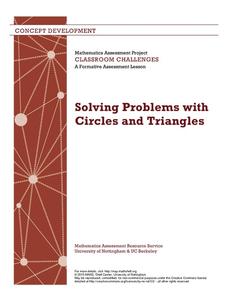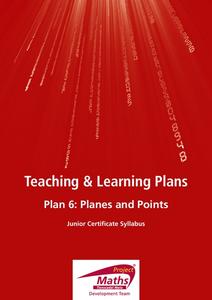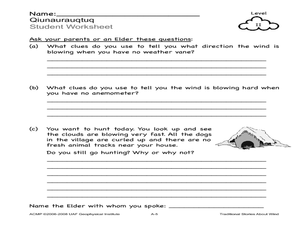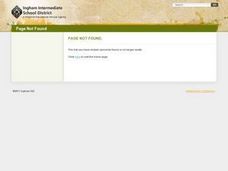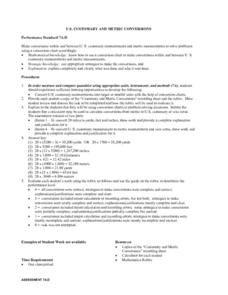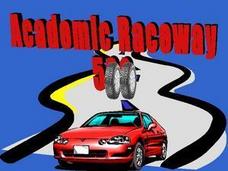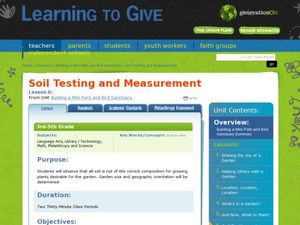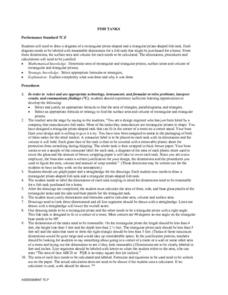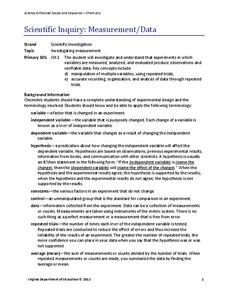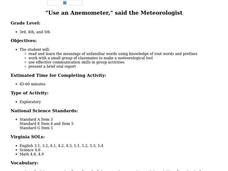NASA
Connecting Models and Critical Questions
Scholars use data to analyze and determine which sets of information need to be counted. They create a model to explain differences among chemical elements using graphs to prove concept mastery.
Teach Engineering
Designing a Spectroscopy Mission
In this mind-bending activity, young engineers explore this question of whether or not light actually bends. Using holographic diffraction gratings, groups design and build a spectrograph. The groups then move on research a problem...
Teach Engineering
Edible Rovers
The good thing about building this rover is you get to eat it afterwards. Pairs determine rover parts they want to include in their design based upon their cost and usefulness. The teams design their rovers, build them from edible...
K12 Reader
Absolute Location
Where in the world are we? As a reading comprehension exercise, kids read a short passage about navigation using latitude and longitude, and then respond to a series of questions based on the article.
Mathematics Assessment Project
Solving Problems with Circles and Triangles
After completing a task involving examining the ratio of areas of triangles and circles in a given figure, scholars examine sample responses to identify other strategies they could use to solve the problem.
Teach Engineering
Stormy Skies
Young meteorologists examine the four main types of weather fronts and how they appear on a weather map. Participants learn about the difference between the types of weather fronts along with their distinguishing features. A...
K12 Reader
Meteorologists
Meteorologists and the tools they use are the subject of a reading comprehension instructional activity that asks kids to read the attached article and respond to a series of comprehension questions.
Project Maths
Planes and Points
Build a solid foundation on which to develop future concepts. Through a guided exploration, learners compare and contrast the characteristics of points, lines, planes, rays, and segments. They measure lengths and practice notation for...
Lied Center of Kansas
The Ugly Duckling and The Tortoise and the Hare
Both The Ugly Duckling and The Tortoise and the Hare are great additions to an elementary language arts lesson. Young readers focus on the literary elements of each story, including characters and plot development, and apply counting and...
Curated OER
Length and Volume Exploration
Students explore how to measure length and volume. They compare and order objects according to their measurable attributes and measure items using non-standard units. Students put 4 pencils in order from shortest to longest after...
Curated OER
Traditional Stories about Wind
Young scholars observe and talk about wind using no weather instruments. In this wind lesson plan, students use their senses to observe wind. They also interview an Elder about wind.
Curated OER
Measure Up!
Young scholars examine parallax and angular measurements. For this investigative lesson students calculate distances of objects and map their results.
Curated OER
Around We Go!
Students make accurate measurements and calculations of measuring the area an perimeter of a section of the floor accordingly. They use appropriate measurement and calculation strategies to write a complete a clear explanation for how...
Curated OER
Meet the Weather Scientist
Fourth graders collect, record and analyze data using simple weather instruments or use weather resources to comprehend weather. They comprehend that scientists are very important people in today's world. Pupils look at cloud types to...
Curated OER
Observing and Predicting Weather from a Weather Station
Fourth graders us a Weather Log data chart to record the date, time, day, and weather. They discuss different instruments and charts needed to record the information. Students turn in their weather logs at the end of two weeks and...
Curated OER
Metric System Challenge
In this measurement worksheet, students complete each of the statements with the correct word related to the metric system. Then they match each letter marked with a number to those at the bottom of the sheet to complete the answer to...
Curated OER
U.S. Customary and Metric Conversions
Students convert U.S. customary measurements into larger or smaller units with the help of conversion charts. They are explained that they are going to use conversion charts in problem solving situations. Pupils use a calculator to...
Curated OER
USING YEAST AS AN ULTRAVIOLET LIGHT MEASUREMENT TOOL
Pupils realize the importance of organisms as standards of measurement and experimentation.The first lab is a simple survival curve that demonstrates the effects of UV light on cells. The second lab looks at repair mechanisms of the DNA...
Curated OER
Academic Raceway 500: Weather
This weather PowerPoint features a game in which students advance to the finish line with a race car as they answer questions related to weather. Topics include types of clouds, weather instruments, the water cycle, and various weather...
Curated OER
Soil Testing and Measurement
Students prepare their garden plot. In this gardening lesson, students use the Internet or book on plants to make sure the plants they have selected will be able to grow in their garden. The students assess and mark out the garden...
Curated OER
Fish Tanks: Volume and Surface Area
Given a very realistic challenge, your young geometers design residential fish tanks in rectangular and triangular prism shapes. They compute the volume of water each will hold. They also determine the size of plastic covers for each...
Virginia Department of Education
Scientific Inquiry: Measurement/Data
While pupils design their own lab experiments, they will not form a new species. Scholars take their materials and design an experiment regarding reaction rates.
Curated OER
"Use an Anemometer," said the Meteorologist
Pupils work in groups to make an instrument the Meteorologists use to measure the speed of the wind after the teacher reads them a poem about the wind. Students then review vocabulary that they studied from their lesson.
Curated OER
Math: Methods of Measurement
Fourth graders practice linear measurement skills by applying various measuring instruments to determine the heights of classmates. By measuring the heights of second graders and fourth graders, they construct tables of height and age...






